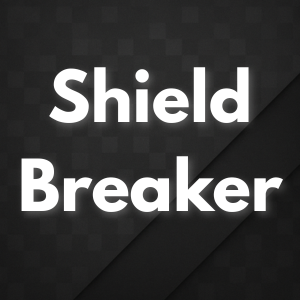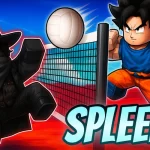Shield Breaker is a powerful Ability in Volleyball Legends, classified under the highest Secret rarity tier. Introduced in Update 14, its primary function is to allow the user’s next spike attack to penetrate or break through opponent blocks, making it a significant offensive tool that challenges standard defensive strategies. It is distinct from the game’s “Style” system, which modifies base stats rather than granting active skills like Shield Breaker.
- Type: Ability
- Rarity: Secret (Extremely low base spin chance, ~0.1% or lower)
- Introduced: Update 14
- Core Function: Makes the next spike penetrate blocks.

- Block Penetration: When activated, Shield Breaker empowers the user’s subsequent spike. This empowered spike ignores or forcefully bypasses standard blocks deployed by opponents at the net, often resulting in a point if back-row defenders cannot react.
- Ball Interaction: Observations suggest the ball might slightly slow down as it passes through the block, rather than phasing through completely, indicating a forceful penetration effect.
- Activation, Cost, Cooldown & Cues: Crucially, specific details on how Shield Breaker is activated (key press?), if it consumes resources, its cooldown duration, and whether it has distinct visual or audio cues before impact are currently unconfirmed based on widely available analysis (). The potential lack of clear warning cues would significantly increase its surprise factor and effectiveness.
Acquisition
Obtaining Shield Breaker is exceptionally difficult due to its Secret rarity:
- Lucky Ability Spins (0.1% / 0.01% Chance): Acquired primarily through the gacha system using Lucky Ability Spins. Base probability is extremely low (sources vary between 0.1% and 0.01%). Normal Ability Spins (if they exist) would have negligible chances.
- Codes: Promotional codes released by developers are a vital source of free Lucky Ability Spins. Codes like
SHIELD_BREAKER,BLOCKING, andSECRET_ABILITYwere released around Update 14 specifically granting these spins. - Secret Pity System: A safety net exists where players are guaranteed a Secret item after a certain number of Lucky Spins without success (reportedly 200 standard, potentially halved to 100 during special “2x Luck” events). Players may be able to choose the Secret item upon hitting pity. Saving Lucky Spins for these events is the most efficient strategy.
- Level Prerequisite: Players generally need to reach Level 15 to unlock or equip Secret abilities.
Shield Breaker serves as a high-impact offensive game-changer:
- Primary Use: Securing points by bypassing strong blockers or coordinated multi-player blocks.
- Optimal Scenarios: Use during critical points (“clutch moments”), against defensively strong teams, or as a surprise tactic to break opponent momentum.
- Mode Effectiveness: Particularly devastating in smaller team modes (2v2, 3v3) where fewer back-row defenders exist to cover behind a broken block. Still highly effective but slightly less guaranteed in 6v6.
- Psychological Impact: The threat of Shield Breaker can force opponents to play more cautiously or alter defensive positioning, potentially creating other openings.
Countering Shield Breaker
Despite initial perceptions of being “overpowered,” effective counters exist:
- Primary Counter: Steel Block (Common Ability): The most direct and widely cited counter. Activating the Steel Block ability with precise timing just before the Shield Breaker spike hits allows a player to successfully block the normally unblockable attack. The fact that Steel Block is a Common ability makes this counter highly accessible.
- Other Tactics:
- Anticipatory Defense: Skilled back-row players might predict a Shield Breaker spike and position themselves accordingly to dig the ball after it penetrates the initial block.
- Offensive Pressure: Preventing the Shield Breaker user from getting a clean set or comfortable approach can disrupt their ability to use it effectively.
- Ability Baiting: Trying to force the opponent to use Shield Breaker prematurely or in a less advantageous situation.
The relationship between Shield Breaker (Secret) and Steel Block (Common) is a key aspect of Volleyball Legends’ balance philosophy:
- Accessible Counterplay: Providing a readily available Common ability (Steel Block) as a direct counter to an ultra-rare, powerful offensive ability (Shield Breaker) prevents the game from being solely dictated by rare item acquisition (luck or spending). It ensures skill (timing the Steel Block) remains a crucial factor in defense.
- Update 14 Context: Shield Breaker was introduced alongside a “Block Rework” in Update 14. It’s possible this rework intentionally or incidentally enhanced Steel Block’s effectiveness, perhaps specifically to counterbalance the new offensive threat.
- Meta Health: This dynamic promotes a healthier meta where even players without the rarest offensive tools have a viable defensive answer, preventing complete dominance by Shield Breaker users and maintaining competitive integrity.
Conclusion
Shield Breaker is a Secret rarity Ability in Volleyball Legends that allows the user’s next spike to penetrate opponent blocks. Introduced in Update 14, it’s a highly impactful offensive tool, acquired through the challenging gacha system (Lucky Ability Spins) aided by codes and a pity mechanic. While extremely powerful, particularly in smaller team modes, it is notably countered by the accessible Steel Block (Common) ability, requiring skillful timing from defenders. This dynamic ensures that while Shield Breaker is a coveted and game-altering ability, it does not render defense impossible, maintaining a balance between rare offensive power and accessible defensive skill. Players should consult official channels (like Discord) for the most current information on its mechanics and balance status ().






